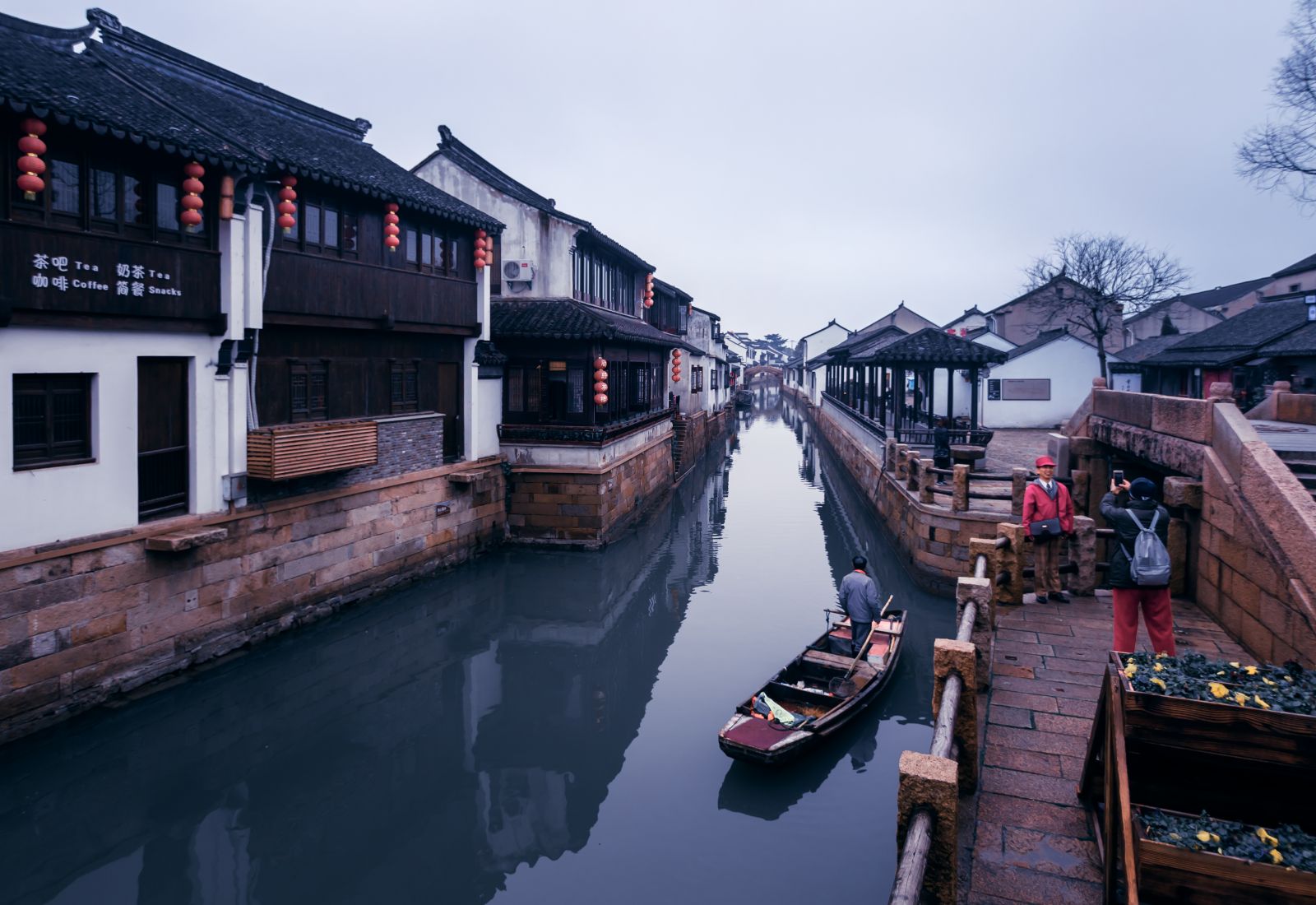Chinese Name: 甪直古镇 Pronunciation: Lùzhí Gǔzhèn
Tourist Area: 72 square kilometres
Address: Wuzhong District, Suzhou City, Jiangsu Province, China
This joint ticket includes Residence of Shen Family, Baosheng Temple, Residence of Xiao Family, Wangtao Memorial Hall, Water Town Clothing and Accessory Museum, Historical Relics Museum, Wansheng Rice Store.
1. Children who are taller than 1.4 meters, as well as aged between 6 and 18 years old can enjoy the preference ticket with a valid certificate.
2. Adults aged between 60 and 69 years old can enjoy the preference ticket with a valid certificate.
| Content | Price |
| Zhangsheng Art Gallery | 20 yuan |
| Zhanglin Park | 20 yuan |
| Boat Trip | 150 yuan |
1. Children under 1.4 meters are free of charge.
2. Persons over 70 years old with valid certificates are free of charge.
| Content | Opening Hours |
| Ancient Town Gate | 8:00-17:00 |
| Ticket Selling Office | 8:00-16:00 |
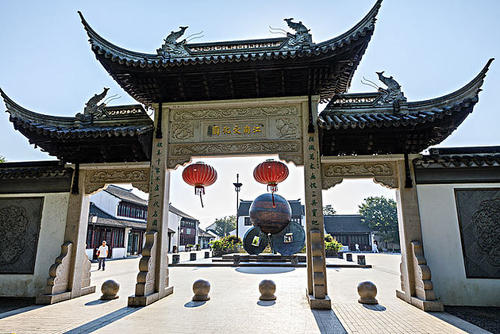
Luzhi Ancient Town, a well-known ancient town in Jiangnan district (the southern part of the Yangtze River), is situated in the eastern Suzhou City, Wuzhong district. It is 18 kilometres to Suzhou Urban District in the west, and 58 kilometres to Shanghai in the east. The whole town covers an area of 72 square kilometres, of which Luzhi ancient town occupies 18 square kilometres.
Luzhi Ancient Town, without exception, has classical features of the Jiangnan water towns. The ancient town is famous for abundant and beautiful rivers, numerous bridges, alleys, old mansions, quite a few celebrities and the Mural of Eighteen Arhats Statue.
Sharing the same age of history as Suzhou ancient town over 2500 years in the Jiangnan area, Luzhi’s history started in the Spring and Autumn Period (about 770 B.C. -221 B.C.), developed in the Wei and Jin Dynasties (220 A.D. - 420 A.D.), and flourished in the Ming and Qing Dynasties (1368 A.D. - 1912 A.D.).
Luzhi Ancient Town owns a large number of lakes, ponds, and pools. The layout of the ancient town maintains the characteristics of traditional Chinese architecture. The five lakes - Cheng Lake, Wanqian Lake, Jinji Lake, Dushu Lake, and Yangcheng Lake, and five rivers - Wusong River, Qingshui River, Nantang River, Jiepu River, Dongtang River, and Dazhi River crisscross the town.
The ancient town is built by the water. Beautiful and attractive scenery, like the winding river and bridges, narrow streets, long lanes and corridors, mottled walls, thousands of households, and hundreds of merchants have attracted a large number of tourists.
What makes people amazed is its long history, beautiful and lovely Jiangnan scenery, profound and rich culture, and numerous places of interest. No wonder Mr. Fei Xiaotong called Luzhi “the first water town in China”.

The unearthed relics prove that ancient people lived here about 6000 years ago. In the 26th year(221 B.C.) of the reign of Emperor Yingzheng in the Qin Dynasty, he set a county here, called Wu County. In 696 A.D., Wu Zetian, a female emperor of the Tang Dynasty, subordinated it to Changzhou County. During the Northern Song Dynasty (960 A.D. - 1127 A.D.), the area was divided and respectively managed by three villages: Yiren Village, Wugong Village, and Sutai Village.
It was not until October 1998 when Luzhi Ancient Town officially opened to the public. In 2001 the town was rated as one of the national 4A scenic spots by the National Tourism Administration. In 2003, it was named as one of the “ten famous historical and cultural towns in China” by the National Construction Ministry and the National Cultural Heritage Administration, and in 2008 it was awarded as the hometown of Chinese folk culture and art.
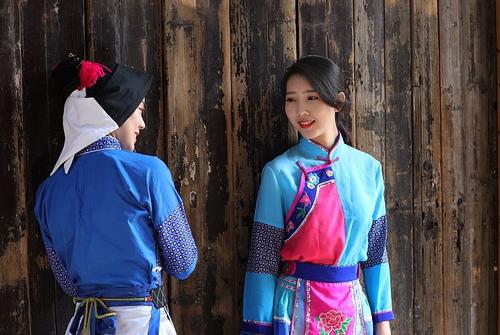
The costume of women here was gradually formed and created over thousands of years. It is special and unique representing the classical style of clothing of women in this area.
There are eight parts of their clothing: two-colour alternating Baotou (a kind of cloth wrapping women’s hair), Dudou which covers chest but exposes back, a shirt with narrow sleeve, pants with harmonious colour, an elegant and flowing skirt, colourful waistband, boat-shaped embroidered shoes, and economical juanpang (socks made of cloth used to wrap shank). In May 2006, the Luzhi clothing of women became one of the first batch of representative works of national intangible cultural heritage.
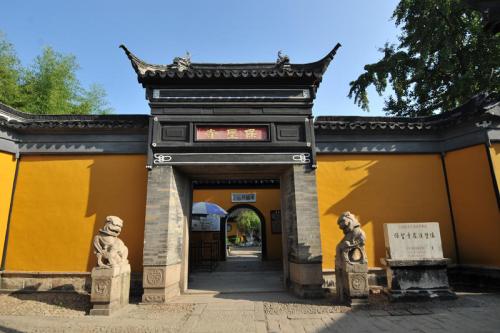
The temple has a long history of over 1500 years. It is said that the well-known Mural of Eighteen Arhats Statue is the work of Yang Huizhi in the Tang Dynasty (618 A.D. - 907 A.D.). The original name of the temple was Baoshengjiao Temple which was first built in 503 A.D. It was listed as one of the first batch of key cultural relics protection units of China in 1961.
The park is located in the southeast of the town covering an area of over 100,000 square metres. The park is a classical park with various functions like entertainment, leisure, sightseeing and it is filled with features of Jiangnan water towns. In the park you can visit Water Town Clothing and Accessory Museum, Historical Relics Museum, Shengtang Fuli Street, Fuli Academy and Central Park Area.
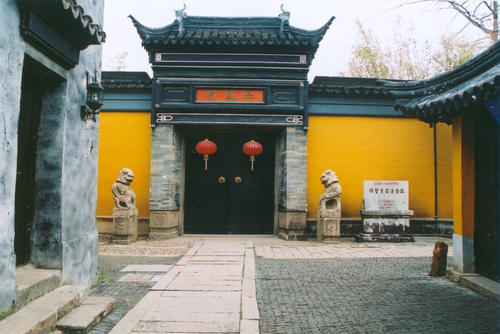
Ye Shengtao Memorial Hall is the former site of “No.5 primary school of Wu County”, where Mr. Ye imparted knowledge and educated students. Now it is listed as a moral education base and a patriotism education base of Jiangsu Province. The exhibition hall mainly shows precious relics, photos and written materials demonstrating various aspects of Ye’s glorious life and his outstanding achievements and significant contributions in education, literature, and social activities, especially that his educational reform practice and literary creation has made great significance to China.
The predecessor of Wansheng Rice Store is Wanchenheng Rice Store. It is located near the southern gate of Luzhi Ancient Town.
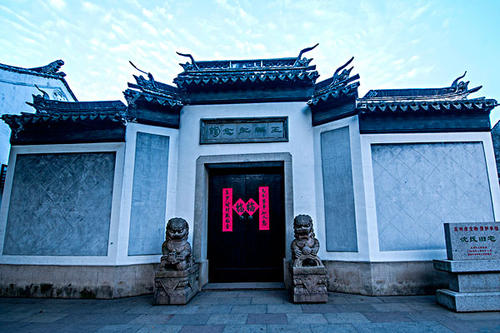
The residence was Mr. Shen Bohan’s former house who was a famous educator and a member of the Chinese Revolutionary League. The house is completely preserved and covers an area of about 3,500 square metres. Now the part that is well-preserved and is opened to the public has an area of nearly 1000 square metres.
Wangtao Memorial Hall
Located in No.6, Xiatan Street, Luzhi Middle City, Wangtao Memorial Hall holds the architecture style of the Qing Dynasty (1636 A.D. - 1912 A.D.), covering an area of about 800 square metres. The hall could be divided into three parts: the exhibition room introducing Wang Tao’s life story, Wang Tao’s former residence and Tao Park.
In 1998, the project of protection and development was officially started. Abiding by the rules of keeping the originality and realness, local people began to take action in the ancient town area to repair buildings and restore the old streets to their original look. All developments relating to culture protection and management of historical buildings are strictly controlled. In December 2012, the Luzhi Ancient Town Protection and Development Management Committee was established which is in charge of the construction and management affairs of the ancient town.
In 2013, positive measures including house reconstruction, river revetment management and old bridge repairing which cost nearly 100 million were taken to renovate the area near Dongshi River. Additionally, five bridges of cultural relics protection such as the Hefeng Bridge and Huanyu Bridge have also been restored.
Jiangsu Province has four distinct seasons. The weather in spring and autumn is mild, while in summer it is hot and in winter it is cold. So, the best time to visit Luzhi Ancient Town is spring and autumn.
If you visit this ancient town in summer when there is much rainfall, carrying an umbrella and sunscreen cream and sunglasses are advisable.
Luduan square → Yong’an Bridge and Xianghua Bridge → Baosheng Temple → Fuli Tomb→ Ye Shengtao Memorial Hall → Residence of Shen Family → Residence of Xiao Family → Hefeng Bridge and Huanyu Bridge → Yutao Memorial Hall → Jiangnan Culture Park → Wansheng Rice Store
Take bus Kunshan 52, 521, 523, and arrive at the Luzhi Bus Station. Then walk about 15 minutes to Luzhi Ancient Town.
Take bus 521, 523, 525, 563, 527 or 528 and then get off at the Luzhi Guzhen(Luzhi Ancient Town) Station. Another 5-minute walking will get you to Luzhi Ancient Town.
Chinese: 请带我去甪直古镇。English: Please take me to Luzhi Ancient Town.
If you go to the Luzhi Ancient Town from Suzhou Railway Station, it takes about 50 minutes (about 90 yuan).
If you go to the Luzhi Ancient Town from Suzhou Yuanqu Railway Station, it takes about 40 minutes (about 70 yuan).
If you go to the Luzhi Ancient Town from North Suzhou Railway Station, it takes about 50 minutes (about 95 yuan).
If you go to the Luzhi Ancient Town from Suzhou Xinqu Railway Station, it takes about 1 hour (about 120 yuan).
If you go to the Luzhi Ancient Town from Sunan Shuofang International Airport, it takes about 1.2 hours (about 220 yuan).
